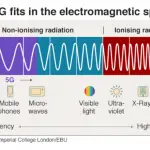Last Updated on 11 months by Francis
Electromagnetic fields (EMF) are present in our daily lives and generated by various electronic devices we interact with, such as laptops and cell phones. However, concerns have been raised over the effect of EMF exposure on reproductive health. One such concern is whether EMF exposure can lead to low egg count in women. In this discussion, we will explore the existing research and evidence on the relationship between EMF and low egg count.
Contents
Understanding EMF
Electromagnetic fields (EMF) are present all around us, from the natural earth’s magnetic field to man-made sources such as mobile phones, Wi-Fi, and electrical devices. EMF is a type of radiation that can affect the human body in various ways, including disrupting the cells’ natural function. The potential health effects of EMF exposure have been the subject of debate among scientists, and more research is needed to understand the risks fully.
The Female Reproductive System
the female reproductive system is complex and delicate, and many factors can affect its function. Women’s ovaries contain thousands of immature eggs, and each month, one or more eggs mature to prepare for ovulation. The egg’s quality and quantity are essential for successful conception, and any disruption to this process can lead to infertility.
Reducing EMF exposure may help protect women’s reproductive health, as some studies suggest that exposure to EMF may affect women’s reproductive systems and disrupt the natural hormonal balance, leading to DNA damage and cell death. It is important to limit mobile phone use, use wired internet, avoid electrical devices in bed, maintain a safe distance from EMF sources, and use EMF protection devices such as shielding materials, pendants, and bracelets that claim to reduce EMF exposure. Though there are several myths and misconceptions regarding EMF and its effects on health, it is crucial to take steps towards reducing exposure to EMF and protecting overall health and well-being.
EMF and Fertility
The effects of EMF on fertility are still unclear, but some studies suggest that EMF exposure may affect women’s reproductive systems. In a study published in the Journal of Fertility and Sterility, researchers found that women exposed to high levels of EMF had a lower number of mature eggs retrieved during in-vitro fertilization (IVF) treatment. Another study found that exposure to EMF altered the menstrual cycle and hormone levels in female rats.
Reducing EMF exposure may help protect women’s reproductive health as there is some evidence to suggest that exposure to EMF may affect the female reproductive system and lower egg count in women, however, more research is needed to fully understand the risks. This can be done by limiting mobile phone use, using wired internet, avoiding electrical devices in bed, maintaining a safe distance from EMF sources, and using EMF protection devices. EMF exposure during pregnancy may also affect fetal development and increase the risk of adverse outcomes, and EMF exposure may also affect overall health and well-being. Additionally, there are several myths and misconceptions regarding EMF and its effects on health, and it is essential to take steps to reduce exposure to EMF and protect your health.
How EMF Affects Egg Count
The exact mechanism by which EMF exposure affects egg count is still unknown, but some theories suggest that EMF may interfere with the ovarian function. The ovaries are sensitive to environmental factors such as temperature, stress, and radiation. EMF exposure may disrupt the natural hormonal balance and cause oxidative stress, leading to DNA damage and cell death.
Protecting Yourself from EMF
Reducing EMF exposure may help protect women’s reproductive health. Here are some tips to reduce EMF exposure:
Reducing EMF exposure may help protect women’s reproductive health, as some studies suggest that EMF exposure may affect the female reproductive system, leading to a lower number of mature eggs, altered menstrual cycles, and hormone levels. While the exact mechanism of how EMF exposure affects egg count is still unclear, it may disrupt the natural hormonal balance and cause oxidative stress, leading to DNA damage and cell death. To reduce EMF exposure, individuals can limit mobile phone use, use wired internet instead of Wi-Fi, avoid electrical devices in bed, maintain distance from EMF sources, and use EMF protection devices. EMF exposure during pregnancy may also affect fetal development and increase the risk of adverse outcomes, and it may also affect overall health and well-being, increasing the risk of cancer, neurological disorders, and other health problems. There are several myths and misconceptions regarding EMF and its effects on health, and while the scientific evidence suggests that EMF exposure may affect cellular function and disrupt natural processes in the body, there is limited evidence to support the effectiveness of EMF protection devices, and the effects of long-term low-level exposure are still unknown and require further research.


.jpg)
.jpg)



